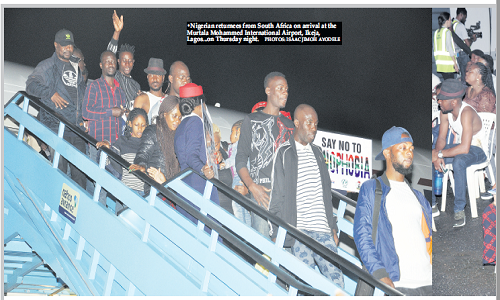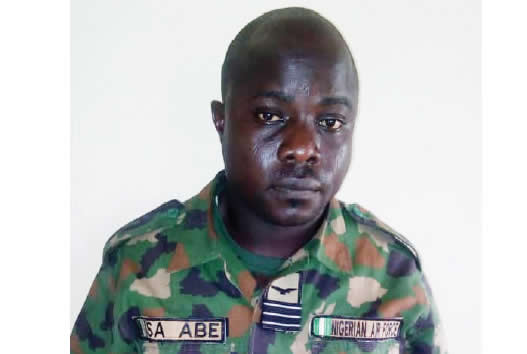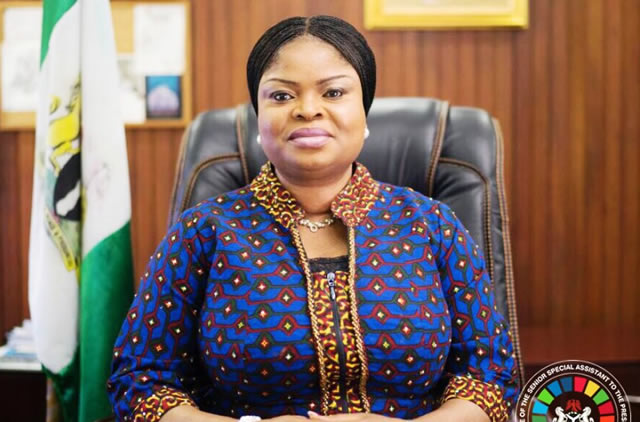
While the spate of xenophobic attacks in South Africa have been sources of serious concern for Nigerians back home, as many fear for the safety of their friends and relatives in the former apartheid enclave, it may be interesting to know that a good number of Nigerians are not just ready to come back home anytime soon. Gboyega Alaka reports.
ON Wednesday, September 11, the first Air Peace plane earmarked to convey Nigerians who may be feeling threatened by the raging xenophobia attacks in South Africa touched down at the Murtala Muhammad International Airport, Lagos, Nigeria. The time was 9.45 and 187 Nigerians, male and female, children inclusive disembarked as against the 320 being expected. The South African authorities reportedly frustrated the evacuation efforts, leading to the reduced number and a 15-hour delay. Home sweet home, you may want to sing; but not so for some of the returnees. The truth, as our reporters found out, is that not all the returnees were excited about coming back home; at least not at this time; not just yet. But like the saying goes: when in danger; safety first.
Because of the opportunities and the enabling environment bequeathed to that country by the long apartheid regime of the white minority, the Rainbow Country, as it is often referred to, presented the best opportunity for adventurous Africans looking to unleash their energy and savvy for business and professionalism. To say the least, many have prospered beyond their own expectations and the country has become more or less home to them. The Nation’s findings reveal that there are indeed many more Nigerians and immigrants from other nations, who are not willing and are just not ready to relocate, even as they fear that another spate of attacks may just be a trigger away. One of such Nigerians is Mr. Wisdom Okoli, a Nigerian Igbo from Anambra State.
Wisdom Okoli arrived Johannesburg, South Africa in 1994; right after the former apartheid country secured its independence from the white supremacists.
He was a youth, full of energy and armed with great footballing skills. Very likely, he must have heard of Kaizer Chiefs, Mamelodi Sundowns; and fancied himself getting a slot in one of them. But dreams are dreams, and not all come to fruition. “I couldn’t make in that area, so I took up a teaching job. I already had a certificate in education back home in Nigeria.â€He recalled.
Two months after taking up the teaching job, what would seem like the first sign of xenophobia reared its head. The South African authorities came up with a law barring all foreigners from their education sector. “I had no option but to resort to buying and selling.â€
That dogged decision, taken about 25 years ago blossomed, and today, the father of five is a major player in that countries agriculture sector, specialising in herb and crop farming.
Asked to shower some light on the crisis and if Nigerians are indeed the ones inviting the attacks upon themselves because of their involvement in crime and loud lifestyle, Okoli said, “Not exactly. The simple truth is that South Africans are tired of immigrants. Not just Nigerians. They are tired of the Pakistanis, Ethiopians, Chinese, Mala wians…; people from all over the world, coming to saturate sectors they feel they should be managing.â€
He explained that this would be the first time xenophobic attacks of this magnitude would be directly targeting Nigerians. “Nigerians are very involved with the South Africans. We have so intermingled with them, married to their people, and created employment in several sectors, that they rarely attacked us. At least not like they do the Ethiopians and the Malawians. “
Okoli admitted though that, “It is not unlikely that the people may be getting envious of the progress being recorded by Nigerians in business in their country. Besides, Nigerians are very visible and identifiable anywhere they are, because of our manner of dressing, which is peculiar, and our lifestyle.â€
He said the two incidents that precipitated these bouts of attacks on foreigners were wrongly pitched on Nigerians. “The first incident, which happened in Pretoria, in which a South African taxi driver was shot and killed, could not have involved a Nigerian because there wasn’t any Nigerian in that area. It was a Tanzanian who was selling drug that the police were chasing, when a bullet accidentally hit and killed the taxi driver. But because of the envy they were beginning to nurse for Nigerians, it was easy for them to conclude that it was a Nigerian that was at the centre of the incident.
“The second incident happened in an area dominated by Ethiopians in Johannesburg, where they sell all sorts of fake big brands in clothing, shoes and bags, such as Louis Vuitton, Versace, Dolce and Gabana etc. The police used to come there to collect bribes and on this occasion came two, three times in a row and the Ethiopians revolted and threw stones at them. Again there were no Nigerians in that area because our people don’t own businesses there. But again, they pinned it on Nigerians.
“That incident angered the indigenes, who could not bear to see foreigners standing up to their police and authorities. So they came out to fight for the police. It was after that that they regrouped and decided to shut down the whole area, insisting that all foreigners must leave; that foreigners were taking over their country.â€
On whether Nigerians’ involvement in hard drug racketeering may be another reason for the attacks, Okoli said, “All foreigners in this country: Moroccans, Ghanaians, Malawians, Tanzanians, Chinese, Bangladeshi, Pakistani, Nigerians are doing drug business; even South Africans themselves are involved. They manufacture and sell. But you know Nigerians, because they are next to the indigenes, hav and certainly not a Nigerian. It is a confirmed case of jungle justice, which is not uncommon here, of a man who stole a handbag. There was a case in the past where something like that almost took place, when a Nigerian received burns after his shop was attacked. But most of the images you see of people being cut or set on fire are not from this country and people are just trying to wipe up sentiments. What happened mainly are attacks on properties.â€
In totality, Sunny-Wenike said about 12 people have been killed in the current attacks and eight of them were South African looters, who got killed during squabbles with the police.
He also said it is not true that the authorities in the country have been standing by and watching while the attacks were being perpetrated.
“Although we are of the belief that they did not act promptly, which was why it escalated, but they have subsequently responded well, as you could visibly see police presence the following day. On Sunday, there was a looming tension in the air; one of the major leaders of the Zulu tribe, which is at the fore-front of these xenophobia attacks, Prince Mangosuthu Buthelezi had come all the way from Kwazulu Nathal to appease and educate them on the need for peaceful co-existence with their African brothers; but as he spoke, a section of the crowd broke away and headed for Johannesburg Central Business District, hoping to wreck more havoc and pass a message to the government. But they could not execute their plan, as information reached the authorities and police were alerted and they were promptly dispersed.â€
Is the situation so tense as to make him jump on the next available plane to Nigeria?
No, was his emphatic answer. “I was at the airport yesterday with the president of the Nigerian Citizens Association in South Africa, Hon. Godwin Adama and the minister in charge of Consular Matters to help in processing the exit of Nigerians who have voluntarily indicated their willingness to leave; but I can tell you that a good of them, say 30%, are people who have made up their mind to go back home even before these attacks, but who had no means. That is not to say there aren’t some who were affected by the attacks. There are thousands of Nigerians who are citizens or who have dual citizenship, and several who have inter-married- I am a father of two, engaged to be married to a South African. There are also Nigerians who gainfully employed in government parastatals, as lecturers in universities, and some who have businesses and own properties. Hence in a situation where governments of the two countries have confirmed that there is no cause for alarm, and where it has been established that it is not a government orchestrated annihilation of the migrant community and the South African president has openly assured the migrant communities that it is taking positive steps to forestall further occurrence, then there is really no cause for alarm. Even the action of the Federal Government of Nigeria to send an envoy to meet with the president of South Africa and the joint efforts of the Senate and House of Representatives, have been doubly reassuring. We however appreciate the gesture of the owner of Air Peace, Chief Allen Onyema to evacuate vulnerable willing Nigerians who have decided to go back. â€
Asked to assess the situation as at the time of this interview, Sunny-Wenike said, “As I speak, there is no tension in the air. Everything is under control. I’m in Johannesburg right now and people are going about their businesses without hindrance, children have gone to school; although there is a call for caution and for the people to be observant as some people may want to capitalise on the recent attacks to cause mayhem. But it is not as if there is palpable danger in the air. I, personally, am going about my business and checking on Nigerian communities to confirm their situations. From what I have gathered, their major concern is for our government in Nigeria to continue to engage the South African authorities, so that there will not be a re-occurrence.
‘If I leave South Africa, it’s for Canada’
John Peters is another Nigerian who is not ready to relocate from South Africa just yet. And when it eventually happens, he is sure it will not be Nigeria, as he has his eyes set on Canada.
Based in Groblersdal in Limpopo Province, Peter arrived in South Africa 14 years ago to study and work. Today, he’s married to a fellow Nigerian and works with a communication firm, while studying law in one of the universities.
Even though he’s been in that country for five whole years, Peter confesses that he still worries over his personal safety and security, due what he describes as the “high crime rate and periodic xenophobic attacks.â€
Like the two respondents above, Peter says the claim that Nigerians are targeted because of their involvement in crime is false and unsubstantiated.
“The claims are not correct because most Nigerians are into legitimate businesses. Some are medical doctors, some are lawyers, teachers, engineers, lecturers, businessmen and women and entrepreneurs. Yes, there is that less than one percent who are into drug business but they sell only to the whites. The drugs (nyaope) consumed by the local South Africans are manufactured by South African blacks and the police and other security agencies are 100% aware of this. Nigerians are not into robbery and are certainly not into human trafficking.â€
On whether the situation is such that he would want to relocate from the Rainbow country, Peter said, “In the future. And when that happens, it will have to be Canada, with my family, for further studies.â€
At the moment though, he says his neighbourhood, which is mainly white-dominated, is calm and peaceful. He fig ures there are about 15 Nigerians in the community.
When reminded that the Federal Government of Nigeria has promised returnees social rehabilitation, his wry answer is, “That’s not enough. They should put more effort into providing adequate infrastructure such as constant electricity, good water, good roads, health and jobs.â€
Anything outside these, he said would be efforts in futility.
Contrary to the notion back home, he, like Okoli and Sunny-Wenike, is of the opinion that South Africans acceptance of Nigerians is high “because an average South African believes that Nigerians are highly intelligent, focused and hardworking, compared to other African migrants.â€
SHARE THIS PAGE WITH OTHERS
Categories: Latest News big sister naija
Updated May 24 2023 08:05 pm
big sister naija
Updated May 24 2023 08:05 pm
 REALITY TV SHOW REQUIREMENTS FOR (BSN)
Updated May 24 2023 08:05 pm
REALITY TV SHOW REQUIREMENTS FOR (BSN)
Updated May 24 2023 08:05 pm
 YOUR DREAM REALITY TV SHOW
Updated May 24 2023 08:05 pm
YOUR DREAM REALITY TV SHOW
Updated May 24 2023 08:05 pm
 A CLUE OR BLUEPRINT FOR REALITY TV SHOW CONTESTANTS
Updated May 24 2023 08:05 pm
A CLUE OR BLUEPRINT FOR REALITY TV SHOW CONTESTANTS
Updated May 24 2023 08:05 pm
 REQUIREMENT FOR REALITY TV SHOW (BSN)
Updated May 24 2023 08:05 pm
REQUIREMENT FOR REALITY TV SHOW (BSN)
Updated May 24 2023 08:05 pm
 BREAKING NEWS on BSN
Updated May 24 2023 08:05 pm
BREAKING NEWS on BSN
Updated May 24 2023 08:05 pm
 modeling is fast rising work in Nigeria
Updated May 24 2023 06:05 pm
modeling is fast rising work in Nigeria
Updated May 24 2023 06:05 pm
 follow our instagram handle at bsnaijaofficial and like any of BIG SISTER NAIJA contestants which you will like to appear in the house
Updated Aug 01 2021 04:08 pm
follow our instagram handle at bsnaijaofficial and like any of BIG SISTER NAIJA contestants which you will like to appear in the house
Updated Aug 01 2021 04:08 pm
 Fraudster disguises as airman, to claim slain officer’s benefits
Updated Jun 07 2020 12:06 am
Fraudster disguises as airman, to claim slain officer’s benefits
Updated Jun 07 2020 12:06 am
 SDGs office denies inserting N33bn allocation in budget
Updated Jun 07 2020 12:06 am
SDGs office denies inserting N33bn allocation in budget
Updated Jun 07 2020 12:06 am